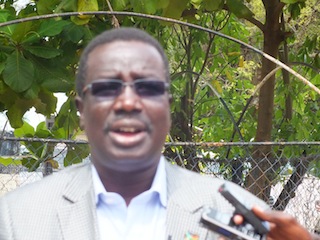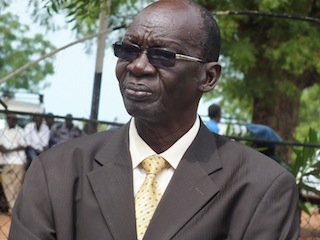Minister told of the problems of university education in Jonglei
September 10, 2013 (BOR) – South Sudan’s minister of education, John Gai Yoh, toured John Garang Memorial University of Science and Technology in Jonglei state on Monday as part of his plan to visit South Sudan’s five national universities in the country.

The minister was escorted by key officials representing all the sectors in the ministry to listen to the problems facing the students, teaching staff, administration and other member of university staff.
The staff told to Yoh that the issue of low pay needed to be addressed. Some teachers leave the profession to take better paid jobs in the many international organisations which operate in South Sudan.
A university official told Sudan Tribune that staff suggested low budgets for infrastructure and services, as well as the lack of qualified lecturers.
The chairperson of the university’s students presented a written document to the minister detailing the problems faced by students on campus.
Among the complaints listed was the failure to follow the academic calendar and the failure poor accommodations. The first batch of students in 2008 spent their entire four or five years of their studies living in tents or half rotten hostels.
The students also complained about a lack of food and medical care. Currently there are below 100 students at the university as many students have stopped attending, perhaps due to the introduction of tuition and accommodation fees amounting to nearly 1,000 South Sudanese pounds.
The minister Yoh left Bor for Malakal on Tuesday where he will visit Upper Nile University.
After visiting Upper Nile state he will travel to Wau in Western Bahr el Ghazal state before returning to Juba to visit Juba university. Once he has visited all five universities he intends to compile a reports report detailing his plans for higher eduction which will be presented to the president.
John Garang Memorial University, South Sudan’s newest, was established as a branch of the Free International University of Moldova in 2008 before it was handed over to South Sudanese government in 2009.
The university lacks modern infrastructure as the offices and lecture halls were constructed using shipping containers.
More than 10 university vehicles are reported to be grounded due to lack of funds to buy spare parts. According to Abel Alier, who is in charge of transport urged the minister to offer them about 50,000 South Sudanese pounds to repair the vehicles.
In 2009, the university received three million South Sudanese pounds to help its establishment. Four years later there are no permanent classrooms, proper curricula or enough trained teachers.

Most students assume that most of the funds were spent on these buildings rather than the more pressing infrastructure needs.
Between 2009 and 2010, around 13 million South Sudanese pounds approved for the university, a move that increased expectations among students. However, no new buildings have been constructed apart from a one building at the centre for finance.
The student union has accused the university’s administration of letting them down.
“In South Sudan, there is a saying that we need capacity building, do our professors need to be trained on capacity building as well. What is the point of sitting in the office from morning till sun[set], just watching TV”, said one of the students, who started walked off when a internal security official approached.
Students claim that the administration uses spies – known as internal security officials – who check that they are not speaking against the administration while on the campus.
The student union has submitted several petitions to the government asking for the vice chancellor to be replaced. So far no has been action was taken.
A teacher at the university told Sudan Tribune, on the condition of anonymity, that details about how much money the university receives each year or semester and how it has been spent is “never been made to the senators”.
“Since I came to this university, we have been asking in the senator meetings to know about the budget, how money the university got and so that we plan on its usage, but you know the VC always declined to tell us anything. Only him [VC] and special people in the red house are informed about the money, nobody else, we just work in [a] vacuum”, he explained.
The United States Agency for International Development (USAID) funds most of the activities at the university including hiring of visiting lecturers either from within South Sudan or from US.
USAID funding, in partnership with Borlaug Texas A&M, is the only source of income to pay for the academics who teach on the campus.
Through USAID funds, modern and multi-purpose laboratory was built and is now waiting to be equipped. This will probably in the dry season when roads are accessible.
Jonglei state’s government, under the former governor Kuol Manyang, who is now the minister of defense, has helped the university with some funds in times of financial difficulties.
(ST)
